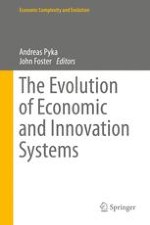2015 | OriginalPaper | Buchkapitel
Metabolic Growth Theory: Market-Share Competition, Learning Uncertainty, and Technology Wavelets
verfasst von : Ping Chen
Erschienen in: The Evolution of Economic and Innovation Systems
Aktivieren Sie unsere intelligente Suche, um passende Fachinhalte oder Patente zu finden.
Wählen Sie Textabschnitte aus um mit Künstlicher Intelligenz passenden Patente zu finden. powered by
Markieren Sie Textabschnitte, um KI-gestützt weitere passende Inhalte zu finden. powered by
